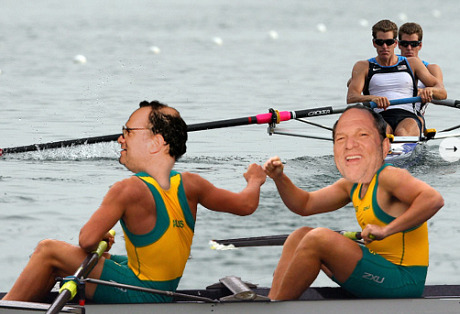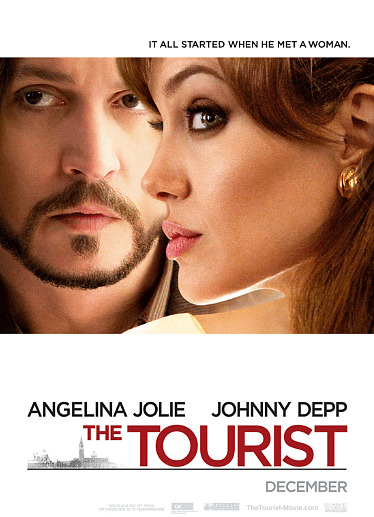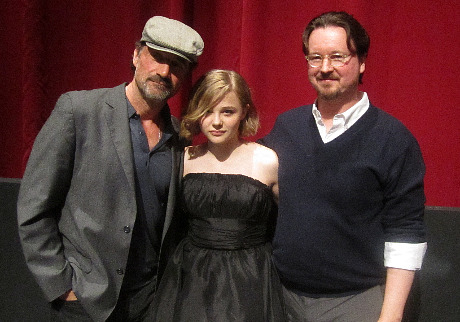Just a reminder to go to iTunes and subscribe to Oscar Poker (podcast #2 coming up next Sunday night) and perhaps leave a rating. “He readers doing this will help your visibility within iTunes,” my tech guy says. If the previous link doesn’t work, try this one.
Ten Network Torpedoes
What are the ten most damaging takedown strategies that The King’s Speech distributor Harvey Weinstein could launch against The Social Network, his film’s current chief competitor for the Best Picture Ocar? The relentlessly-on-the-case Vulture has come up with a half-serious, mildly amusing checklist.

The two funniest suggestions: (a) Do a Norbit on Timberlake — Just before the nomination deadline, remind the industry that Social Network Best Supporting Actor contender Justin Timberlake has a voice role in Yogi Bear, which will presumably give King’s Speech Best Supporting Actor contender Geoffrey Rush an advantage. And (b) Do a Mo’Nique on Jessie Eisenberg — “In recent interviews,” the rationale goes, “The Social Network‘s Eisenberg — competition for King’s Speech‘s Colin Firth for Best Actor — has hinted that he’s slightly uncomfortable with all the attention the role is getting him. Does he even want an Oscar? Is he the next Mo’Nique? Questions that must be asked! Preferably by complicit Oscar bloggers!”
Yeesh
Deadline‘s Michael Fleming is reporting that Fox 2000 and Universal are making seven-figure bids on an original Beach Boys musical, based on a pitch to be written by Susannah Grant (Erin Brockovich). Pic will reportedly “craft a storyline with the surf and fun prevalent in the band’s many hits.” In other words, a Beach Boys version of Across The Universe? Fleming’s kiss-of-death closer: “The template for the film is to do with the Beach Boys catalog what Mamma Mia! did with Abba.” Good God.
Anomaly
One thing about Let Me In (Overture, opening today) that’s getting through to moviegoers who read movie blogs or reviews is that it’s only superficially a “horror film.” The horror genre belongs to the wallowers and the animals and the Eli Roth-fiends, and this is a film that some genre fans are going to feel confused by. Why aren’t there more boo scares? Why isn’t there more of a sense of an accelerating nightmare? Why do the characters speak so softly to each other?
Let Me In is too good, too classic-minded, too well acted, too sensitive and too gradually paced to qualify as a “horror film,” or at least what that term tends to mean in the minds of most moviegoers. It uses the trappings of horror — vampires, drinking of blood, killings, ominous atmospheres — but it’s about love and loneliness and the needing of emotional comfort by children (okay, tweeners) whose families have fallen away and failed to provide.
Please take note of this, Academy members. There hasn’t been a “horror film” nominated for Best Picture since The Exorcist (forget the feminist-minded psychological FBI thriller The Silence of the Lambs), but the time has come to go back to this dark well and let a horror film “in” by nominating it for Best Picture. You can refuse to consider this film because it adheres to conventions of what you regard as a disgraced genre, but you really, really shouldn’t do this. Not this time.
Boiled down, Let Me In is a highly unusual and deeply affecting young-love story. It’s been made with restraint, sensitivity and high levels of intelligence. Please open your minds and don’t throw the baby out with the bathwater. Director Matt Reeves has created a distinguished exception to the rule.
Hold Your Horses
Again — how fresh or stunning can a presumably better, more delectably photographed, Charles Portis-novel-adhering version of True Grit be? Okay, better than Henry Hatahaway‘s 1969 film…and? No matter how righteous the Coen Bros. sheen, it’ll still be True Grit — raunchy blowhard Reuben (not Rooster) Cogburn matching wits with Mattie Ross. I expect nothing but quaalude highs, but what can it finally add up to? People are having advance heart palpitations, and I’m not so sure. (Kris Tapley‘s In Contention had it first.)

Kid Vampires vs. Morons
“You might want to ask your readers about audience reactions to Let Me In starting today,” says HE reader Christian Hamaker. “I saw it last night with a large contingent of press, but also a sizable audience of regular moviegoers. And the reactions to this film were perplexing.
“People simply don’t know how to respond to a vampire movie that doesn’t deliver traditional scares. They tittered with expectation that a Big Scare was about to come, and laughed at some of the early relationship between the two young principal characters — both somewhat understandable in the earlygoing. But at some point, they were laughing too hard, presumably, I’m guessing, they simply don’t know how to respond to a movie that doesn’t offer up Freddy Krueger-ish boo-scares.
“At one point, a frustrated critic behind me shouted to the other audience members, ‘Shut the f*%k up!’ I think he spoke for several of us who appreciated the movie’s artistry.”
Note: The “moron” screening technically happened in Maryland, just over the border from Washington, D.C., but it was held for Washington, D.C., or D.C.-area media.
Oyster Bay
A powerful metaphor from the mind of F. Scott Fitzgerald looms large in Shawn Levy‘s review of The Social Network in The Oregonian as well as Ann Hornaday‘s review in The Washington Post:
Levy: “Indeed, as in David Cronenberg‘s The Fly, when a drunken lovers quarrel leads the hero into a rash act that changes him forever, Aaron Sorkin‘s Mark Zuckerberg sets down the path that will eventually lead him to billions while soaking in a beer-fueled snit fit at a girl (Rooney Mara) who won’t have him. In a sense, all that follows — the programming marathons, the less-than-above-board business dealings, the efforts to position the web site and turn it into a phenomenon — is spurred by Zuckerberg’s yearning for this dream girl. She is Daisy Buchanan to his Jay Gatsby, and the green light on a distant dock has morphed into the refresh button on a Facebook page.”
Hornaday: “What ensues is a narrative that hews closely to classic American tales of ambition, ingenuity, competition and betrayal; The Social Network has understandably been compared to Citizen Kane in its depiction of a man who changes society through bending an emergent technology to his will. But with its leitmotif of striving, resentment and cherchez la femme, the story also evokes Fitzgerald at his most longing and elegiac. A modern-day Jay Gatsby, the ‘refresh’ button on his keyboard standing in for Daisy Buchanan’s flashing green dock light, Zuckerberg — or at least Sorkin’s version of him — embodies all those timeless contradictions and of-the-moment tics (the hoodie, those flip-flops) that make for a classic literary anti-hero.”
Too Bad
It feels very strange to sympathize with Paris Hilton, but paparazzi are a pestilence. Watch this video and tell me what happened here (fat female paparazzo with plaid shorts has her foot run over when Hilton’s boyfriend inches his car forward) as a hit-and-run incident is delusional. Stuff happens, just desserts.
Homework
I’ve been lazy but no longer. Sometime this weekend I’ll settle in with the DVD of Jerome Salle‘s Anthony Zimmer, a French-language thriller (plastic surgery, money-laundering, mistaken identity) which Florian von Henckel Donnersmarck‘s The Tourist (Sony, 12.10) is a remake of. And as long as I’m researching, I’d be grateful to receive a PDF of the script (written by Donnersmarck, Chris McQuarrie and Julian Fellows)

Update: A 2008 draft of The Tourist script says “screenplay by Julian Fellows, revisions by William Wheeler, based on “Anthony Zimmer” by Jerome Salle, current revisions by Jeffrey Nachmanoff.” So it’s Fellows, Wheeler, Nachmanoff, von Donnersmarck and Chris McQuarrie. Wait for McQuarrie, regarded in some circles as a bit of pompous dickwad, to start strutting around and taking most of the credit for the screenplay when it opens in December.
Still Water
In Matt Reeves‘ Let Me In, 13 year-old Chloe Moretz gives a deeply affecting award-calibre performance as an emotionally conflicted 300 year-old vampire named Abby, and she does it almost entirely with her eyes. She’s Jodie Foster in 1975 only more so, and has really earned consideration as a Best Actress nominee. Catching this emotional puppy-love vampire pic for the second time convinced me. As did Moretz’s appearance this evening at the School of Visual Arts Theatre — she’s got poise, smarts, the whole package.

Calm Down
“If the over-60 Academy members fail to note that The Social Network is a brilliant, whippersnapper Citizen Kane-level movie about the Realm of the Now (and the Very Recent) that addresses CLASSIC THEMES, what am I supposed to do about it? Send them a complimentary month’s supply of Depends?
“I’ll tell you what SHOULD be done about it. All past-it, over-the-hill geezers should be COMPASSIONATELY EXPELLED FROM THE ACADEMY. This is not a put-down or a putsch or a purge. It’s just that when a genuinely good movie comes along and people are too thick to at least show respect and acknowledge that it’s doing several things right, then there’s only one thing to do and that’s to cut them off. Because all they’re doing is STANDING IN THE WAY.
“What did George S. Patton (George C. Scott) do when he found a mule obstructing his troops in Italy? He shot the mule and had him thrown over the side of a bridge.” — my response to a question from Gold Derby/Envelope guy Tom O’Neil about how Academy members may react to The Social Network‘s first big membership screening on Saturday, 10.2.
Other know-it-alls — Sasha Stone, Anthony Breznican, Stecve Pond, Dave Karger, Eric Davis — are also heard from in O’Neil’s piece.
Doesn’t Calculate
Having seen Secretariat, I really don’t get where the alleged faith-based Christian marketing angle fits in. The film is aimed at family audiences– it has a square and conservative vibe — and director Randall Wallace is something of a rightie, I’m told, but there’s nothing in the story/screenplay that proclaims Christian or conservative values per se. I saw that vein in The Blind Side but it’s simply not in Secretariat.
Thematically it’s a quasi-feminist thing, being about Diane Lane‘s Penny Chenery defying her husband (who wants her to stay at home and raise the kids and cook) and brother (who wants her to sell the horse farm) in order to nurture and bring along her horse, Secretariat, to a Triple Crown victory. The tone is little like The Adventures of Spin and Marty — nice and tidy and middle-class, but in no way a religious-type deal except for the strange playing of the spiritual tune “O Happy Day” twice on the soundtrack.



